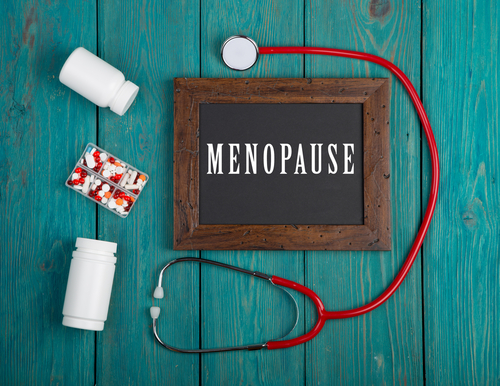What Is Menopause?
Posted April 08, 2019 in Menopause
While many women find themselves stressing over unwanted changes and facial imperfections such as wrinkles or fine lines when they age, they may soon find themselves realizing their menstrual cycle is another thing to add to the list of changes. Menopause is a biological process that occurs when a woman has not had her menstrual cycle for one full year, usually beginning between the ages of 40 and 50.

The body experiences several changes due to the dropping levels of estrogen, which means the hormones that help regulate your menstruation cycle begin to decline. Your period becomes heavier and longer, and your ovaries stop producing eggs eventually leading to no menstrual cycle at all. Although this is part of the natural aging process, menopause can be overwhelming for many women and comes with some uncomfortable symptoms.
How Does Menopause Affect Me?
Many women who go through menopause come to realize their experience will not always be the same as others. However, they may share similar signs and symptoms leading up to menopause.
Stress
One of the most significant symptoms to occur during menopause is stress. Knowing that your body is going through so many changes and you no longer have the energy you once did can cause women to feel stressed and anxious.
Hot Flashes
When women experience menopause, they usually feel their body temperature getting warmer than usual, even if they are indoors. Hot flashes and night sweats can occur in many women as they age, which usually causes them to feel “flushed” while they sweat excessively around the face, neck, chest, armpits, and back. Women often feel that their clothes are constricting them during these episodes, and their skin appears redder than usual.
Weight Gain
As we age, our metabolism slows down. We start to develop weak muscle mass and tissue in our bodies. Weight gain is an unpleasant symptom that comes with menopause, and many women find themselves acquiring unwanted and excess fat depots in areas of their bodies that wasn’t there before. This means eating your favorite snacks and fast food may not be the best choice as it may stick around a little longer than it did in the past.
Vaginal Dryness and Urinary Complications
When your estrogen level begins to decline, your sexual life may take a hit also. Many of the body’s natural tissues begin to develop less elasticity as you age, especially along the urinary tract and genital areas. During menopause, the vagina and urinary tract can become less flexible, less lubricated, and more easily injured, which can cause women to feel embarrassed.
Moods swings
Mood swings are perhaps the most common symptom many women find themselves experiencing when going through menopause. Because of low estrogen and hormone levels, women begin to feel more emotional and find themselves becoming more aggressive or depressed about certain things they didn’t before.
Menopause is something that all women experience in their lives. Learning the symptoms and how to cope with the change is beneficial to a healthy and happy life.
Schedule a consultation today!

How to Cope With Menopause
Many women entering menopause often feel like their whole world is turning upside down when trying to cope with uncomfortable symptoms like hot flashes and dizziness. Although every woman’s experience is different, they may all feel anxious with these new changes their body is going through. Here are some informative tips that can help ease your transition into menopause.
Maintain a Healthy Diet
What you eat can often affect your body. Maintaining a balanced and healthy diet will help your body regain energy and get the proper nutrients it needs. Eating whole foods like fruits, vegetables, high-quality proteins, and grains can also reduce menopause symptoms. Dairy products that contain calcium like milk, yogurt, and cheese are also essential for bone health.
Exercise
Exercise is a great way to fight against mood swings during menopause. Taking light walks outside or getting together with an exercise buddy will not only release tension from your body, but it can also stabilize your mood and help you get rid of stubborn fat that may have developed from menopause.
Manage Stress
Stress can cause many women to lose focus as well as have a significant impact on their body during menopause. Methods like meditation, drinking herbal teas, or reading a book can calm your nerves and anxiety. Getting plenty of rest can also help your body relax and ease your stress. If you feel your stress may be too much to handle on your own, reaching out to a close family member or friend can be beneficial to your health.
Improve Your Sex Life
During menopause, many women may see a decline in their sex life due to experiencing vaginal dryness or even discomfort when having intercourse. When this happens, many women feel embarrassed and self-conscious about their femininity. Using creams and lubricants during sex will not only prevent irritation or injury to your vagina, but it will also boost your confidence and self-esteem.
Seek Medical Treatment
Sometimes talking with your doctor regarding hormone therapy may be just the thing you need to get through your menopause years. Certain medications can help reduce symptoms like stress, mood swings, and anxiety. Many women can also benefit from combining homeopathic remedies with medications to experience a more comfortable transition into menopause.
To learn more about menopause, you can call our office at (707) 575-1626 or schedule a consultation with us online. We are happy to answer any questions or concerns you may have.